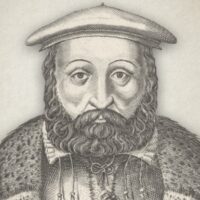
Chapter 9: The Omnipotence of God, Part 2
Position 3.—God, as the primary and efficient cause of all things, is not only the Author of those actions done by His elect as actions, but also as they are good actions, whereas, on the other hand, though He may be said to be the Author of all the actions done by the wicked, yet He is not the Author of them in a moral and compound sense as they are sinful; but physically, simply and sensu diviso as they are mere actions, abstractedly from all consideration of the goodness or badness of them.
Although there is no action whatever which is not in some sense either good or bad, yet we can easily conceive of an action, purely as such, without adverting to the quality of it, so that the distinction between an action itself and its denomination of good or evil is very obvious and natural.
In and by the elect, therefore, God not only produces works and actions through His almighty power, but likewise, through the salutary influences of His Spirit, first makes their persons good, and then their actions so too; but, in and by the reprobate, He produces actions by His power alone, which actions, as neither issuing from faith nor being wrought with a view to the Divine glory, nor done in the manner prescribed by the Divine Word, are, on these accounts, properly denominated evil. Hence we see that God does not, immediately and per se, infuse iniquity into the wicked; but, as Luther expresses it, powerfully excites them to action, and withholds those gracious influences of His Spirit, without which every action is necessarily evil. That God either directly or remotely excites bad men as well as good ones to action cannot be denied by any but Atheists, or by those who carry their notions of free-will and human independency so high as to exclude the Deity from all actual operation in and among His creatures, which is little short of Atheism. Every work performed, whether good or evil, is done in strength and by the power derived immediately from God Himself, “in whom all men live, move, and have their being” (Acts 17:28). As, at first, without Him was not anything made which was made, so, now, without Him is not anything done which is done. We have no power or faculty, whether corporal or intellectual, but what we received from God, subsists by Him, and is exercised in subserviency to His will and appointment. It is He who created, preserves, actuates and directs all things. But it by no means follows, from these premises, that God is therefore the cause of sin, for sin is nothing but illegality, want of conformity to the Divine law (1 John 3:4), a mere privation of rectitude; consequently, being itself a thing purely negative, it can have no positive or efficient cause, but only a negative and deficient one, as several learned men have observed.
Every action, as such, is undoubtedly good, it being an actual exertion of those operative powers given us by God for that very end; God therefore may be the Author of all actions (as He undoubtedly is), and yet not be the Author of evil. An action is constituted evil three ways— by proceeding from a wrong principle, by being directed to a wrong end, and by being done in a wrong manner. Now, though God, as we have said, is the efficient cause of our actions as actions, yet, if these actions commence sinful, that sinfulness arises from ourselves. Suppose a boy, who knows not how to write, has his hand guided by his master and nevertheless makes false letters, quite unlike the copy set him, though his preceptor, who guides his hand, is the cause of his writing at all, yet his own ignorance and unskilfulness are the cause of his writing so badly. Just so, God is the supreme Author of our action, abstractedly taken, but our own vitiosity is the cause of our acting amiss.
Jerome Zanchius (1516-1590) was an Italian pastor, theologian, writer and reformer during the Protestant Reformation. After the death of Calvin, Zanchius’ influence filled the void, which was copiously met by a large written ministry. Among his most popular works are, “Confession Of The Christian Religion”, “Observation On The Divine Attributes” and “The Doctrine Of Absolute Predestination”.
Jerome Zanchius on Absolute Predestination (Complete)




